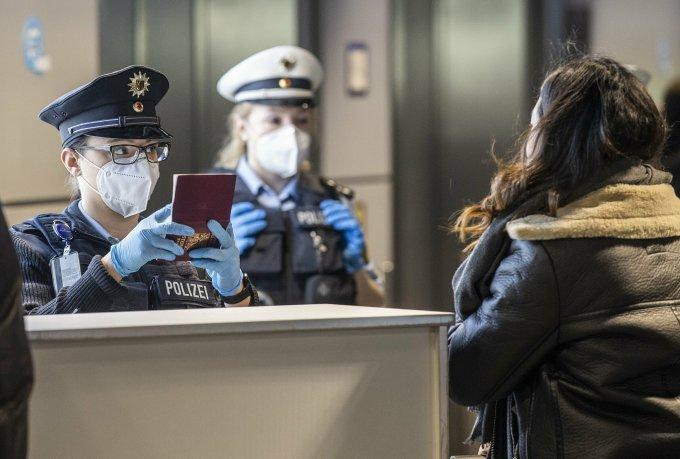Germany gives reasons for stopping issuing visas for new Vietnamese passport models
The German Embassy said the new Vietnamese ordinary passport lacks information about place of birth, making it difficult to check and verify, so visas cannot be issued.
Vietnam's new ordinary passport, issued since July 1, is temporarily not recognized in Germany and cannot issue visas due to lack of information on place of birth, the German Embassy in Vietnam told reporters today.VnExpress.
"Information on the place of birth can only be determined through the 12-digit personal identification number and compared with the seven-page list," the German Embassy said. "It is not possible to clearly identify a passport holder without the place of birth, especially due to the many cases of duplicate names. German authorities cannot find information on the place of birth through the personal identification number in the passport."
 |
German police check passenger passports at Frankfurt airport on January 24, 2021. Photo:AP. |
According to the German Embassy, this forces German authorities when checking new Vietnamese passports during immigration control and domestic inspection to always manually check against the list, while not all people on duty have that list.
The agency added that many passports submitted to the German embassy did not have personal identification numbers, mainly those of minors, as well as some passports where the place of birth stated did not match the real place of birth.
A representative of the Immigration Department, Ministry of Public Security, said on the morning of July 28 that the Consular Department, Ministry of Foreign Affairs will invite a German representative to work to find a plan to ensure the rights of citizens.
This representative affirmed that Vietnam's new passport model has complied with international regulations and practices, and any arising issues will be given priority to be handled through diplomatic channels.
Previously, the website of the German Embassy in Vietnam announced that holders of the new Vietnamese ordinary passports with a purple-blue color and serial numbers starting with the letter "P" will not be able to apply for a type C or D visa to enter Germany. "Your application will not be accepted until further notice," the German representative office said.
Type C visa (also known as Schengen visa) allows entry into one of the 26 Schengen countries and free movement within the territory of the remaining 25 countries without having to go through any other entry procedures. Meanwhile, type D visa (or German national visa) is issued by the German Embassy or Consulate in Vietnam, allowing free movement within the 25 Schengen countries with a maximum stay of 90 days.
German authorities have warned people who have been issued visas in the new passports not to travel to the country because of the "risk of being refused entry at the border". According to instructions from German domestic authorities, the above regulation will apply until further notice.
According to the announcement of the German Federal Police, Schengen countries when issuing short-term visas to Vietnamese citizens holding new passports must exclude Germany from the visa validity area. Holders of new passports are not allowed to enter or transit in Germany.
However, holders of old (blue) passports or holders of residence permits in the Schengen area are not affected.
The new passport model, issued by the Ministry of Public Security from July 1, is meticulously designed, with each page showing images of landscapes, symbols of national sovereignty, and famous cultural heritages such as Ha Long Bay, Hue Imperial City, Hung Temple, Hoi An Ancient Town, My Son Sanctuary, Nha Rong Wharf, Lung Cu Flagpole, etc.
The passport remains the same size, 88 mm wide, 125 mm long and about 0.75 mm thick, but the cover color has changed to dark blue. These innovations contribute to promoting the image of Vietnam to the world and showing the historical and cultural traditions of the country.

.jpg)




.jpg)

